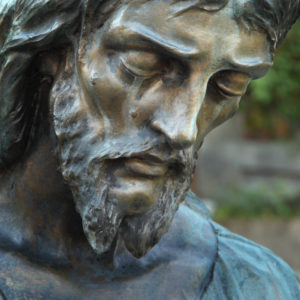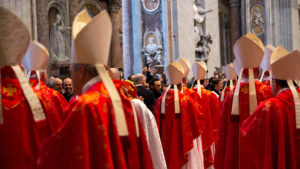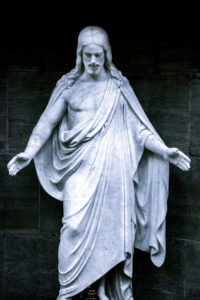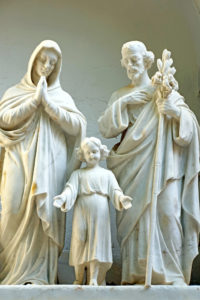Tell all the Truth but tell it slant –
Success in Circuit lies.
Too bright for our infirm Delight,
The Truth’s superb surprise.
As Lightning to the Children eased
With explanation kind,
The Truth must dazzle gradually
Or every man be blind –
– Emily Dickinson (1830-1886), from “Tell all the Truth but tell it slant” (1865)
 We have spoken at length about the fact that neither mainstream Christianity nor mainstream science has any wish to discover the truth about how reality actually works. Both have cherished dogmas to support, and constituencies with interests that they must protect, so the body of evidence that afterlife researchers have developed over the past hundred and fifty years has been disparaged and dismissed or outright ignored by our two most trusted institutions. Sometimes you and I have actually chuckled about this situation. It’s like having a couple of elderly aunts living in the attic who create a nuisance by feeding stray cats on our back porch. They irritate us, but in a benign sort of way. Auntie Chris and her equally addled scientific sister are making a mess, but they are very old and living in a past that is irrelevant to us now. How much longer can this possibly go on? The intransigence of both science and Christianity has seemed for a long time to be nearly harmless, and ultimately self-limiting. Christianity is just a belief-system anyway, and science advances by deaths (as Max Planck so memorably said). Any minute now, this century-long scientific stonewalling of the truth will end when the last old materialist bull dies away. Or so I have thought. Right up to the moment when I couldn’t think that way anymore.
We have spoken at length about the fact that neither mainstream Christianity nor mainstream science has any wish to discover the truth about how reality actually works. Both have cherished dogmas to support, and constituencies with interests that they must protect, so the body of evidence that afterlife researchers have developed over the past hundred and fifty years has been disparaged and dismissed or outright ignored by our two most trusted institutions. Sometimes you and I have actually chuckled about this situation. It’s like having a couple of elderly aunts living in the attic who create a nuisance by feeding stray cats on our back porch. They irritate us, but in a benign sort of way. Auntie Chris and her equally addled scientific sister are making a mess, but they are very old and living in a past that is irrelevant to us now. How much longer can this possibly go on? The intransigence of both science and Christianity has seemed for a long time to be nearly harmless, and ultimately self-limiting. Christianity is just a belief-system anyway, and science advances by deaths (as Max Planck so memorably said). Any minute now, this century-long scientific stonewalling of the truth will end when the last old materialist bull dies away. Or so I have thought. Right up to the moment when I couldn’t think that way anymore.
Christianity and science both claim to own the truth in their respective spheres, but both of their versions of the truth are based in self-serving falsehoods. From their positions of longstanding trust and respect, these two institutions continue to tell us fables that most people continue to believe. If science and Christianity were a pair of criminal enterprises fighting for control of our treasure, they would do nothing differently!
Christianity claims to be based in Jesus, but in fact it uses Him as a figurehead while paying little mind to what He actually said. It claims to be our worthy guide in spiritual matters, when in fact what it teaches is human-made ideas that are downright spiritually harmful. It won’t look at the afterlife evidence because it is so heavily invested in its own ideas that are based in little more than Medieval guesses. So, tell me. Why should we trust this institution?
 Science claims to be our reliable source of information about the world around us, when in fact it chooses arbitrarily to investigate only what it considers to be material. Honest scientists have known for a century that matter is just energy and nothing is solid, but the scientific community won’t tell us that. Instead, they keep demanding more and more funding so they can pursue their baseless theories, undaunted by the fact that success still eludes them. Beyond bringing us myriad ways to make our lives more comfortable, what new truths have scientists really discovered in the past hundred years?
Science claims to be our reliable source of information about the world around us, when in fact it chooses arbitrarily to investigate only what it considers to be material. Honest scientists have known for a century that matter is just energy and nothing is solid, but the scientific community won’t tell us that. Instead, they keep demanding more and more funding so they can pursue their baseless theories, undaunted by the fact that success still eludes them. Beyond bringing us myriad ways to make our lives more comfortable, what new truths have scientists really discovered in the past hundred years?
And these are the only widely trusted non-governmental institutions in Western culture! Both of them are demonstrably wrong and bent on flogging lame ideas, and neither of them will take responsibility for its own longstanding errors. People trust them primarily because we want to know the essential truths that no other source seems able to provide. But they have never accepted responsibility for actually investigating anything! And their guesses and fabrications are in no way harmless.
In fact, the ongoing refusal of both mainstream science and mainstream Christianity to investigate the afterlife evidence is the source of every evil that is currently loose in the world. Once most people realize their lives are eternal, everything will change for the better! But instead, to this day Western culture assumes that the competing scientific and religious views of the afterlife are our only options. And whichever horse you might choose to ride, whether it’s religious or scientific, the view that both institutions give you of yourself is awful! You are meat, or you carry original sin. Either way, you are venal, selfish and evil, and together all heading for the same pointless end. At your death, either you will blink out like a light, or you will face a choice between roasting in hell or tediously singing hymns forevermore. There is nothing about our lives that means anything.
 Even when the guidance we are being fed is preposterous, most of us are stuck with using it to try to build our own views of ourselves and the world. And when the guidance we are getting from our two most trusted sources insists that only matter is real, and God is a cranky guy on a throne or else no God exists at all, then each of us is forced to build a worldview that is both erroneous and unpleasant. As our trust in those failing institutions has waned, our personal search for the truth has become more individual and more desperate. The result has been the alarming rise in recent years of the twin banes of atheistic nihilism and societal strife.
Even when the guidance we are being fed is preposterous, most of us are stuck with using it to try to build our own views of ourselves and the world. And when the guidance we are getting from our two most trusted sources insists that only matter is real, and God is a cranky guy on a throne or else no God exists at all, then each of us is forced to build a worldview that is both erroneous and unpleasant. As our trust in those failing institutions has waned, our personal search for the truth has become more individual and more desperate. The result has been the alarming rise in recent years of the twin banes of atheistic nihilism and societal strife.
Atheistic Nihilism. If atheism means that one does not believe literally in the Christian God, then I am an atheist. What open-minded researchers have discovered is a Godhead that is infinitely greater and far more loving than the petty and cranky Christian God. The scientific evidence is such that we should be excitedly investigating this wondrous new development! But overriding our happy news is the stark kind of atheism that is rapidly spreading in the West, and holds that not only is there no God, but also there is no point and no meaning.
Societal Strife. Since we are unable to build our worldviews around an open-minded search for the truth by our most trusted institutions, we each are forced to think through and construct our own individually-developed ideas. And then, of course, we defend our ideas against attacks by others who prefer their own ideas, until the only possible truth about anything is whatever you individually believe. We see this happening in our civic life, to the point where we needn’t even discuss it here; and it happens in our personal life as well. At this point, even Christians are at war with one another over trivial details of their beliefs-based dogmas.
 But even worse than the rise of atheism and daily strife, stonewalling by our most trusted institutions is forcing us all to live steeped in fear! Until the truth about death and the afterlife is much more widely known, humankind’s general default setting is one of stark terror of the yawning void. And, tragically, our societal terror of death seems to be hardest on teenagers and young adults. Even I was afraid, despite my two experiences of light! But those experiences at least emboldened me enough that I risked investigating what is true, taking literally the invitation of the Lord to “Ask, and it will be given to you; seek, and you will find; knock, and it will be opened to you. For everyone who asks receives, and he who seeks finds, and to him who knocks it will be opened” (MT 7:7-8). And when I asked for the truth with an open mind, I found a whole new gigantic reality far greater than anything we have heretofore imagined! With the help of open-minded folks who have some scientific training, we could learn enough to begin a glorious dawning of the truth all over the world!
But even worse than the rise of atheism and daily strife, stonewalling by our most trusted institutions is forcing us all to live steeped in fear! Until the truth about death and the afterlife is much more widely known, humankind’s general default setting is one of stark terror of the yawning void. And, tragically, our societal terror of death seems to be hardest on teenagers and young adults. Even I was afraid, despite my two experiences of light! But those experiences at least emboldened me enough that I risked investigating what is true, taking literally the invitation of the Lord to “Ask, and it will be given to you; seek, and you will find; knock, and it will be opened to you. For everyone who asks receives, and he who seeks finds, and to him who knocks it will be opened” (MT 7:7-8). And when I asked for the truth with an open mind, I found a whole new gigantic reality far greater than anything we have heretofore imagined! With the help of open-minded folks who have some scientific training, we could learn enough to begin a glorious dawning of the truth all over the world!
But sadly, more than ten years after I joined the public afterlife community, progress in the field of afterlife education still has gone nowhere. A lot more evidence has been developed, and we know in greater detail what is going on, but neither science nor Christianity still shows the slightest interest in investigating all this evidence. There have been no hopeful breakthroughs. At this point, those who were expecting to see breakthroughs have lost a lot of their enthusiasm. And what is worst of all is the fact that both Christianity and science are still giving us awful views of who and what we are! Not a syllable of what either institution tells us about ourselves is true. But due to the frankly evil nonsense they teach, too many of us still continue to live as if there is no point to anything.
 It is going to be up to us to work together to begin a new age of actually seeking and finding the truth. We are currently developing a website whose purpose will be to educate people about the afterlife from every perspective, as the evidence actually reveals it to us. We expect to be ready to roll next month! But first, to help you better see how important these efforts are going to be, next week we’ll look at how the world around us is likely to change for the better once most people know for certain that every human life is eternal. I think you will be happily surprised to see just how much of a universal fix this single change might be….
It is going to be up to us to work together to begin a new age of actually seeking and finding the truth. We are currently developing a website whose purpose will be to educate people about the afterlife from every perspective, as the evidence actually reveals it to us. We expect to be ready to roll next month! But first, to help you better see how important these efforts are going to be, next week we’ll look at how the world around us is likely to change for the better once most people know for certain that every human life is eternal. I think you will be happily surprised to see just how much of a universal fix this single change might be….
“If you hold to My teaching, you are really my disciples.
Then you will know the truth, and the truth will set you free.”
– Jesus (JN 8:31-32)
































































